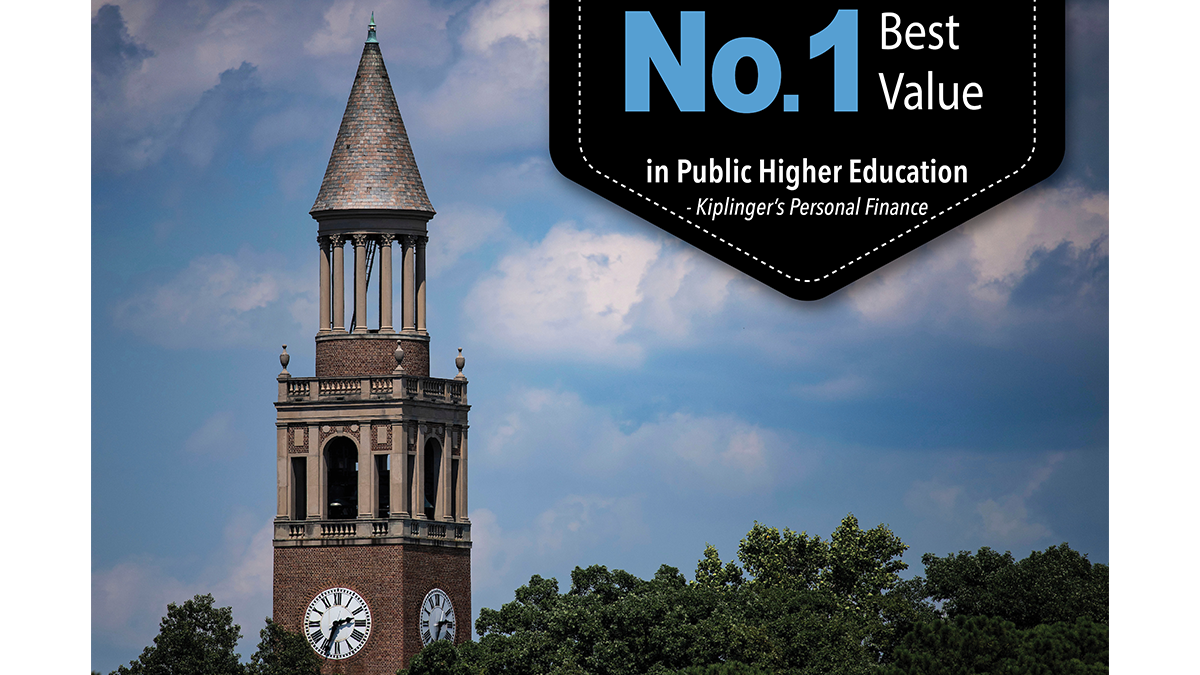Kiplinger’s Personal Finance magazine awards UNC-Chapel Hill the top ranking due to innovative initiatives that keep higher-education costs low and support students to graduation.

Once again, the University of North Carolina at Chapel Hill is being recognized for its work to make a high-quality education accessible to talented students from all backgrounds.
For the 18th time, Kiplinger’s Personal Finance magazine has ranked UNC-Chapel Hill the No. 1 value in American public higher education. Carolina has topped the list every year Kiplinger’s has published a “best value” ranking.
The University also climbed 12 spots on the overall “best value” list to No. 2.
“Carolina’s top rankings say a great deal about the dedication and excellence of our faculty, students and staff,” said Interim Chancellor Kevin M. Guskiewicz. “At Carolina, we are committed to helping our students achieve their dreams in every area of human endeavor. To accomplish this, we provide a superb and affordable education, without fear of overwhelming debt, that prepares our students to solve the grand challenges of our time. Being recognized for the 18th consecutive time as the best value in American public higher education – and as second in overall best value – demonstrates our ongoing commitment to access, affordability and quality.”
As the nation’s first public university, Carolina is widely recognized as a leader in U.S. public higher education for its commitment to accessibility and affordability. For nearly 20 years, Carolina has been pioneering initiatives to improve college affordability and striving to keep costs low for every student.
It is one of the few public flagship universities to practice need-blind admissions and provide low-debt, full-need student aid. Over 38% of full-time undergraduate students receive need-based financial aid. Forty percent of the Class of 2017 graduated with no student loan debt and for those students who did borrow, the average debt at graduation was $22,214, compared to the average of $28,650 nationwide.
Some of the ways Carolina has expanded college affordability include:
- Carolina Covenant: Launched in 2004, this groundbreaking initiative gives eligible students whose household income is less than 200% of the federal poverty level the opportunity to graduate from Carolina debt-free. Today, nearly 13% of UNC-Chapel Hill undergraduates are Covenant Scholars.
- Blue Sky Scholars:On its 225th anniversary, the University announced the Blue Sky Scholarship to provide financial aid for middle-income undergraduate students from North Carolina. The University estimates the Blue Sky Scholars will graduate with debt of $10,000 or less.
- Carolina Edge: As part of the Campaign for Carolina, the University’s $4.25 billion fundraising effort, the Carolina Edge seeks to raise $1 billion for undergraduate scholarships and graduate fellowships in areas such as the Carolina Covenant, middle-income scholarships, merit scholars, summer internship grants, athletics and graduate and professional school financial aid.
- Generous need-based financial aid packages: Ninety-three percent of institutional financial aid and scholarship resources are devoted to meeting financial need, with only 7% directed to merit-based scholarships.
“One of the best ways we can serve North Carolina and the world is by sending out well-equipped graduates unburdened by excess debt. But our commitment doesn’t end there,” said Steve Farmer, vice provost for enrollment and undergraduate admissions. “We want to ensure that all our students, no matter who they are or where they come from, have the resources and the encouragement they need to pursue their dreams to the fullest.”
Carolina employs a number of initiatives that have proven results of improving outcomes for low-income students. Through these efforts, the gaps in retention and graduation rates between low-income and other students have narrowed dramatically over the last decade and are now almost completely closed. The retention rate for first-year students with financial need for the fall 2017 cohort was 96.9%, as compared to 97.4% overall. The four-year graduation rate for students with financial need for the fall 2014 cohort is 83.5%, compared with 87.2% overall.
The following programs are some of the initiatives Carolina has to support students through their college career to graduation:
- Carolina Firsts: Making up nearly 20% of our undergraduate population, Carolina Firsts are students that come to Carolina from a family in which neither parent has a college degree. These students are paired with faculty and staff advocates who were also first-generation students and connected with academic and social support programs to help them throughout their college experience.
- The Finish Line Project:Funded by a U.S. Department of Education grant, The Finish Line Project initiates and evaluates innovative programs for student success, helping more first-generation college students access and complete their education. This data-driven initiative helps train faculty on how to support active learning and design courses to reduce attrition. Special programs help support underrepresented populations, like rural students and transfer students.
- C-STEP:The Carolina Student Transfer Excellence Program guarantees admission to Carolina for low- and moderate-income students who successfully complete specific requirements at any of the 13 partner community colleges. The program offers students special events, advising, and transition and support services both at their home college and once they have enrolled at Carolina.
The Kiplinger’s rankings are developed based on measures of academic quality, including SAT or ACT scores, admission and retention rates, student-faculty ratios and four-year graduation rates. The editors then rank the schools using cost and financial aid measures. Academic quality carries more weight than costs.
The full rankings are now available online at kiplinger.com/links/colleges and will appear in the Sept. 2019 print issue of Kiplinger’s Personal Finance, on newsstands Aug. 13.




